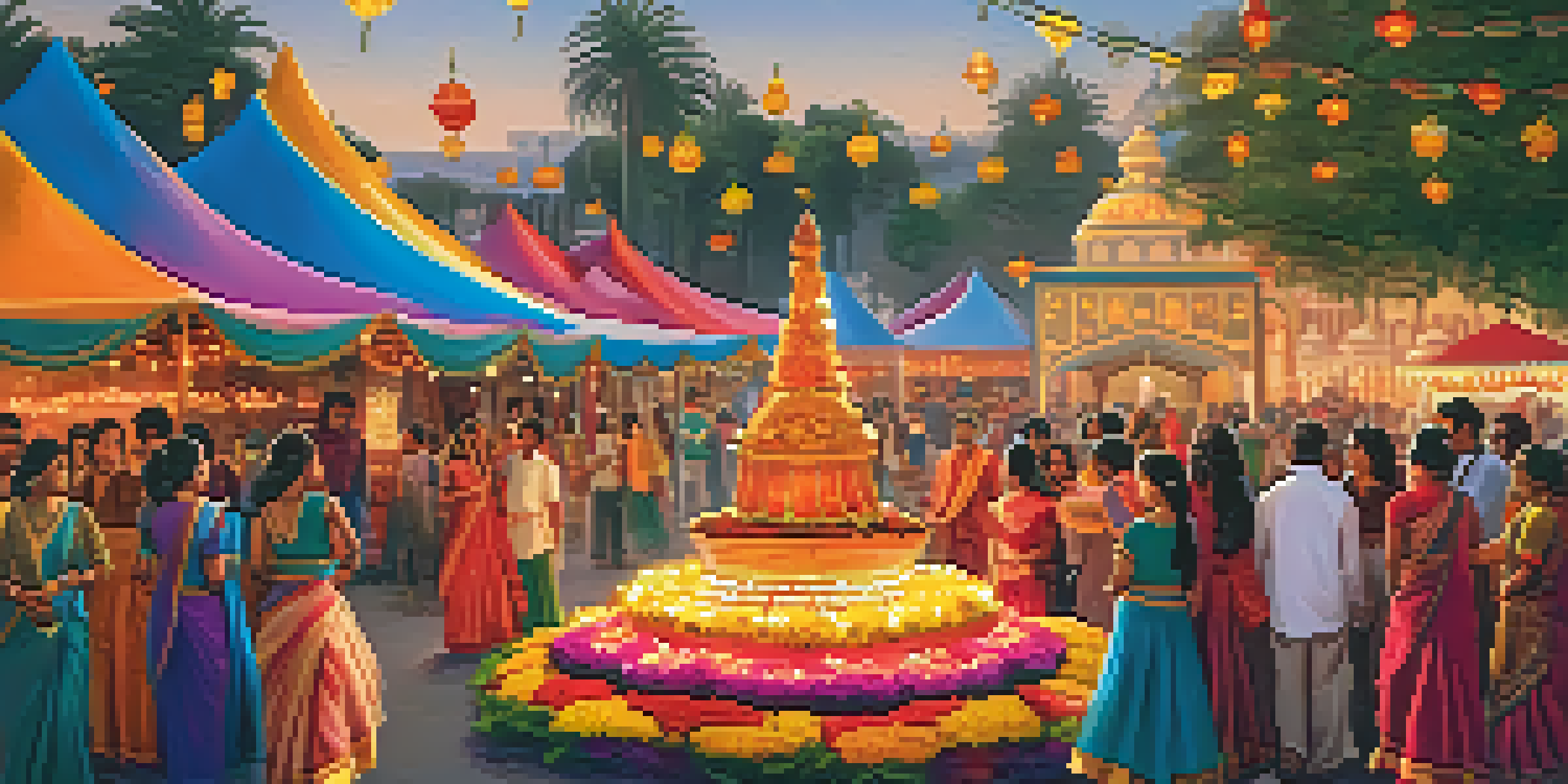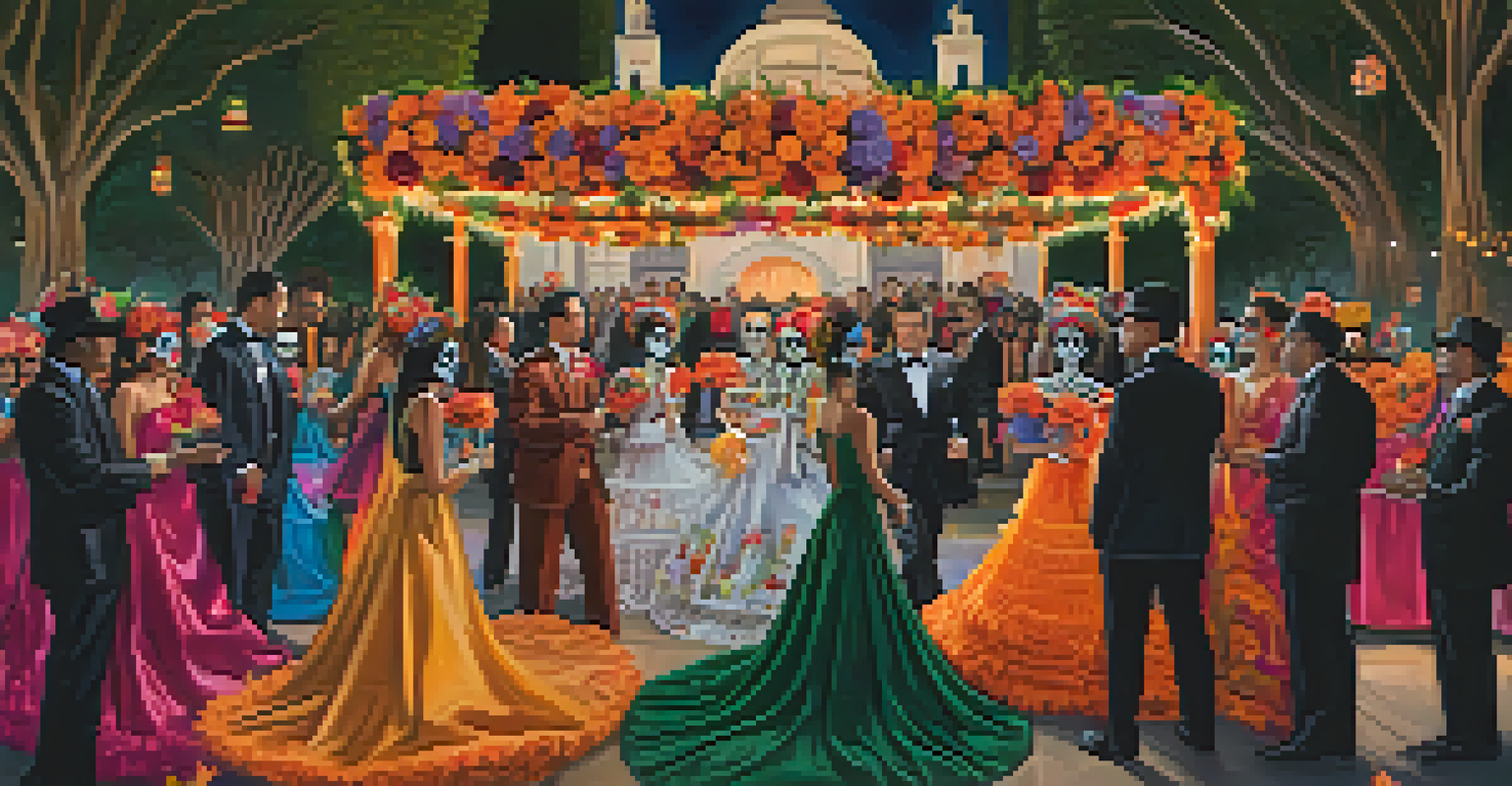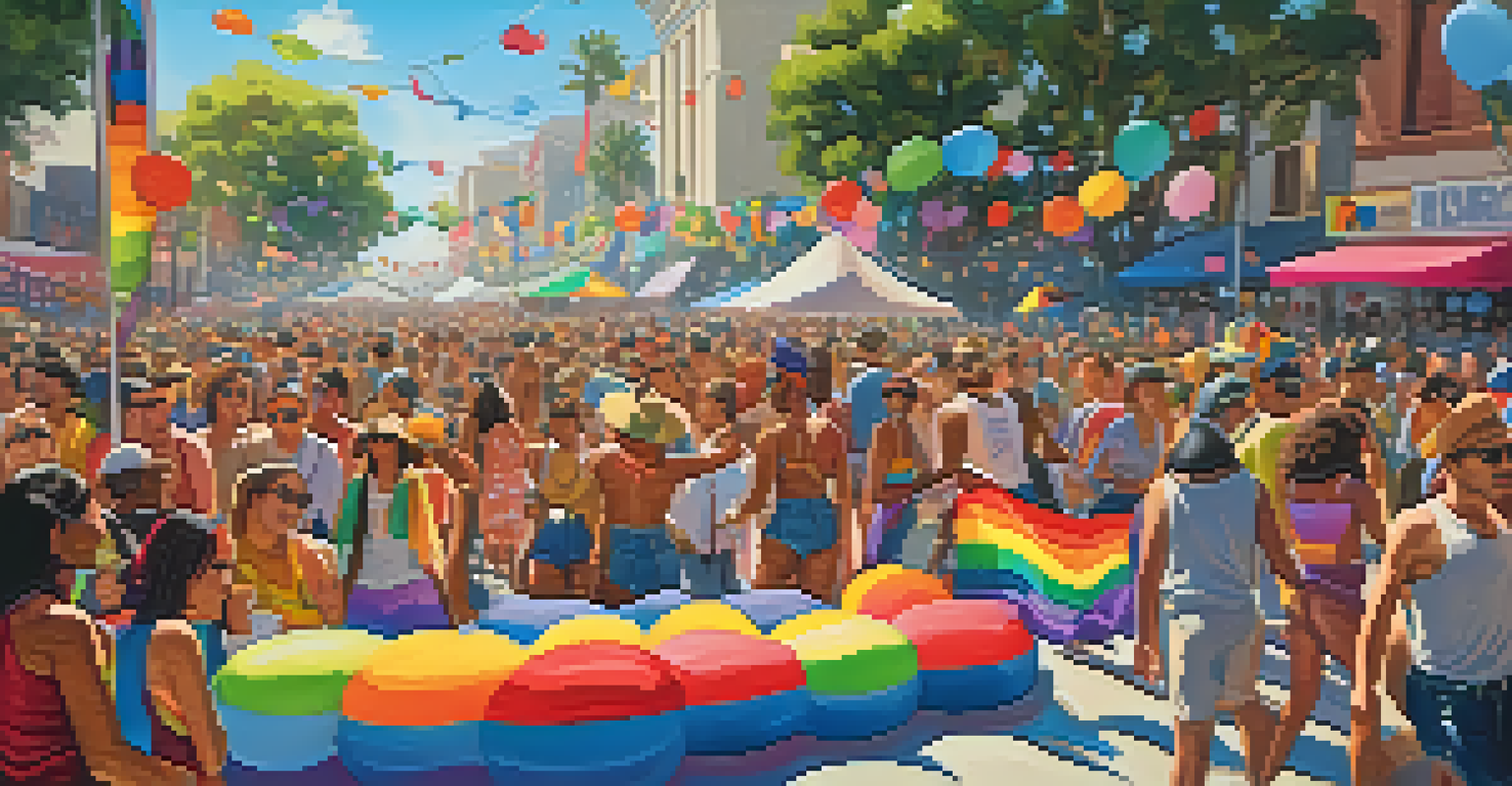The Connection Between Religion and Cultural Festivals in LA

The Diverse Religious Landscape of Los Angeles
Los Angeles is a melting pot of cultures and religions, featuring a rich tapestry of beliefs. From Christianity to Buddhism, Judaism to Hinduism, the city is home to countless faith communities. This diversity not only enriches the spiritual life of the city but also influences its celebrations. Understanding this landscape helps us appreciate the depth of cultural festivals that take place throughout the year.
Diversity is not a reason for division, but a reason for connection and understanding.
Among the various religions, the presence of immigrant communities has significantly shaped local traditions. Each group brings unique customs and festivals, showcasing their heritage and spirituality. This blend of traditions manifests in various events, making LA a vibrant hub for cultural expression. It's fascinating to see how these religious backgrounds contribute to a shared sense of community and celebration.
Ultimately, the diverse religious landscape sets the stage for festivals that reflect the city's multicultural identity. These celebrations are more than just events; they are opportunities for connection and understanding. By engaging with these festivals, attendees can gain insights into different faiths and cultures, fostering a sense of unity in diversity.
Major Religious Festivals Celebrated in LA
Los Angeles hosts numerous religious festivals that draw crowds from all over the city and beyond. For instance, the annual Diwali Festival showcases Hindu traditions with vibrant dance, music, and delicious food. Similarly, the Los Angeles Festival of Books includes various readings and discussions centered around Jewish themes, attracting literature lovers and scholars alike. These events not only celebrate faith but also highlight the artistic expressions tied to those beliefs.

The beauty of these festivals lies in their ability to invite participation from people of all backgrounds. While they are rooted in specific religions, the festivities foster an atmosphere of inclusion. For example, the Nisei Week celebrates Japanese American culture, combining Buddhist practices with traditional Japanese customs. This openness encourages a wider audience to engage and learn about different cultures.
LA's Festivals Celebrate Diversity
Los Angeles hosts a vibrant array of religious festivals that reflect its multicultural identity and foster community connections.
Moreover, these festivals often serve as platforms for interfaith dialogue and collaboration. As attendees immerse themselves in the celebrations, they encounter various perspectives and practices. This engagement can lead to greater understanding and respect among diverse communities, breaking down barriers and building bridges.
The Role of Food in Cultural and Religious Festivals
Food plays a central role in many cultural and religious festivals in Los Angeles, serving not just as sustenance but as a way to connect with traditions. Each festival features unique dishes that reflect the beliefs and customs of the community. For example, during Lent, many Christian communities in LA enjoy special meals that adhere to fasting practices, while Ramadan brings forth an array of traditional dishes shared during iftar celebrations.
Food is a universal language that brings people together, transcending cultural and religious boundaries.
Sharing food at these festivals often symbolizes hospitality and community bonding. It’s not just about eating; it’s a way to express love and togetherness. At events like the annual Taste of Mexico festival, attendees can explore authentic dishes, which often have deep cultural and religious significance. This culinary aspect invites everyone to participate and experience the culture on a personal level.
Additionally, food can act as a bridge between generations, preserving age-old recipes and traditions. Families often gather to prepare festival meals, passing down stories and rituals associated with each dish. This creates a sense of continuity and belonging, reinforcing the cultural heritage that these festivals celebrate.
Art and Performance: A Reflection of Faith
Artistic expression is another vital component of cultural and religious festivals in Los Angeles. From traditional dance performances to contemporary art installations, these events showcase the creativity inspired by faith. For instance, the annual Día de los Muertos celebration at Hollywood Forever Cemetery features elaborate altars, colorful costumes, and performances that honor deceased loved ones, blending spirituality with artistic expression.
The performing arts, including music and dance, also play a significant role in these festivals. The sound of mariachi bands during the Feast Day of Our Lady of Guadalupe creates a festive atmosphere that resonates with cultural pride and religious devotion. Such performances not only entertain but also serve as a medium for storytelling, conveying the history and significance of various traditions.
Food Unites Cultures at Festivals
Food plays a crucial role in cultural and religious festivals, symbolizing hospitality and preserving traditions across generations.
Moreover, these artistic elements often promote cultural preservation and innovation. Artists and performers are inspired by their faith, creating new interpretations that resonate with modern audiences. This dynamic interplay between tradition and contemporary expression enriches the festival experience, making it memorable and impactful.
Interfaith Collaboration in Festival Planning
Many cultural festivals in Los Angeles are the result of interfaith collaboration, showcasing the spirit of unity among diverse religious communities. Groups often come together to plan and organize events that celebrate their shared values and respect for one another's traditions. This collaboration not only enhances the quality of the festivals but also promotes understanding and dialogue among different faiths.
For example, the Unity Festival aims to bring together various religious organizations to foster a sense of community. Through shared activities, performances, and discussions, participants can learn about each other's beliefs and practices. This collaborative effort highlights the importance of inclusivity and respect in a multicultural society.
By working together, these communities can create festivals that reflect a broader spectrum of cultural and religious experiences. This approach not only enriches the events themselves but also creates lasting relationships between different faith groups. Ultimately, these festivals become a testament to the power of collaboration in promoting harmony and understanding.
The Impact of Cultural Festivals on Local Communities
Cultural festivals have a profound impact on local communities in Los Angeles, serving as vital venues for social interaction and community building. These events bring together individuals from various backgrounds, creating opportunities for friendships and connections. As attendees engage in shared experiences, they foster a sense of belonging and pride in their cultural heritage.
Additionally, these festivals often support local economies by attracting visitors and stimulating business. Local vendors, artists, and performers benefit from the exposure and sales opportunities provided by these events. For example, the LA Pride Festival not only celebrates LGBTQ+ culture but also boosts local businesses by drawing in large crowds, creating a win-win situation for everyone involved.
Interfaith Collaboration Enhances Events
Many cultural festivals in LA are the result of interfaith collaboration, promoting unity and understanding among diverse religious communities.
Moreover, cultural festivals can be catalysts for social change, addressing issues relevant to the communities they represent. Many festivals incorporate discussions and workshops focusing on social justice, equality, and cultural preservation. This engagement encourages attendees to reflect on their roles in the community and inspires action towards positive change.
The Future of Religion and Cultural Festivals in LA
As Los Angeles continues to evolve, so too will its cultural and religious festivals. The future promises to bring even more diverse expressions and innovations in how these celebrations are conducted. With technology playing a significant role in our lives, virtual and hybrid festivals may become more common, allowing wider participation while maintaining the essence of tradition.
Moreover, the blending of new cultural influences will shape the festivals of tomorrow. As more communities emerge and settle in Los Angeles, they will bring unique traditions that enrich the already vibrant festival scene. This evolution reflects the dynamic nature of culture, continuously adapting while honoring its roots.

Ultimately, the connection between religion and cultural festivals will remain strong, serving as a reminder of the city’s rich heritage and commitment to inclusivity. As we look ahead, these celebrations will continue to foster understanding and connection among diverse communities, ensuring that Los Angeles remains a vibrant tapestry of cultures.